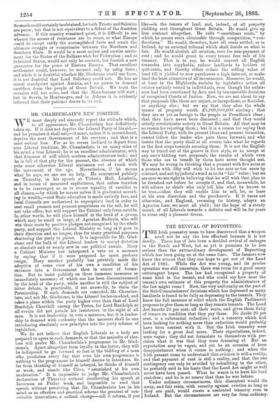THE REVOLUTION IN ROUMELIA.
THE revolution in Roumelia is not in itself and by itself an important one. The clause in the Treaty of Berlin which divided Bulgaria in two was considered by Lord Beacons- field important because it enabled him to say that he had saved a province to the Sultan ; but it gave the Sultan nothing of any value. The chiefs of the Turkish Army, seeing, as General Gordon pointed out at the time, that any garrison posted in the Balkans would be surrounded by hostile Bulgarians to the north and insurgent Bulgarians to the south, and could at any moment be starved out, never sent a garrison there, and East Roumelia, though nominally Turkish, became practically free. As, however, the Bulgarians justly regard the suzerainty of Turkey much as Scotchmen would regard the suzerainty of Morocco, and are ardently desirous to commence political life as citizens of an undivided State, it was certain that the disjoined provinces would come together, and there was no reason for any longer delay. There was no particular necessity for preparations, though some were probably made, for the popular mind was quite ripe, and in the face of an unanimous decision, there was no chance of resistance. Even the worthy Serb who had suffered himself to be lowered by the title of Gavril Pasha, and who was supposed to rule the Province, only talked of a protest in writing, and was placed under a mild arrest without a shot being fired. There was no bloodshed, for every one welcomed the change, which makes Bulgaria a stronger, richer, and more independent State ; and Prince Alexander, when he arrived at Philippopolis, found that he had nothing to do except proclaim himself Prince of Southern as well as Northern Bulgaria, and await a European decision. There was, of course, a possibility that the Sultan might resist ; but it was only a possibility. The Sultan really lost nothing by the revolution, for he could not appoint a Mussulman Governor of East Roumelia ; he could not, whomever he appointed, plunder the Province ; and he could not make the people support any portion of his Army. There was nothing to fight for, while fighting was extremely dangerous. If the Turks conquered the country they would have to give it up again ; while in conquering they would probably rouse popular passion not only in Russia, which Turkey is accustomed to face, but in the Hapsburg Monarchy, which Turkey, with reason, greatly dreads. The Hapsburg Emperor, with two-thirds of his Army Slav, cannot allow Philippopolis to be treated as Batuk was ; and an invasion of East Roumelia might cost the Sultan all his European possessions. The nervous and half-taught but keen-witted despot who reigns for a time at Constantinople forbade, therefore, any immediate action ; and if the affair is limited to Bulgaria, we do not doubt that accomplished facts will speedily be acknowledged. Russia does not like the change, because a strong Bulgaria will be a nucleus for all South Slays ; Austria does not like the change, because she is not ready to march to Salonica ; and Lord Salisbury does not like the change, because he helped to draw up the cancelled clauses of the Treaty of Berlin. But none of them can interfere. The Czar cannot alienate Russian feeling, the Emperor of Austria cannot affront Slavic feeling, and Lord Salisbury cannot outrage English feeling, by restoring the withering dominion of the Turk in a Christian province which has just escaped it. There will be a quantity of writing, but if Prince Alexander is firm, he will reign in both Bulgaiias ; and as the Turk cannot dis-
miss him, or fine him, or send him orders, his nominal position as vassal for part of his dominions will signify no more than the Queen's position as a vassal Princess in Cyprus. It is-a little discreditable and dishonouring, but that is all. So far as Bulgaria is concerned, too much has been made of the revolution ; but there is a question behind the Bulgarian one which may disturb the world. Will Macedonia consent to remain quiet for a few more months or years ? The people of that grand Province are in a frightful situation. They are at present slaves, lying at the mercy of an Asiatic and Mahommedan soldiery, who detest them as Asiatics and Christians ; who know that they are deadly enemies, always plotting insurrection ; and who have no motive for sparing them, inasmuch as their own ultimate and final withdrawal is a mere question of months. The Macedonians, therefore, live in hourly dread of a visitation to which ordinary "repression " by a military Government is child's-play, while events all around them are calculated to drive cooler men than themselves frantic with excitement. Half of them are Greeks, and have recently seen Thessaly released ; while the other half are Bulgarians, and are now seeing Bulgaria restored as a free and united State. It must seem to the Macedonians as if their hour also had arrived, as if further submission were shameful, and as if they could hardly have a better opportunity. They have shown much patience ; and with Mr. Gladstone out of power, and Austria threatening in the distance, they may still remain quiet ; but they may also rise, and if they rise, it is difficult to imagine how a final settlement can be hoped for without bloodshed. The Turkish soldiers, who are incurably convinced that terror is their best instrument, will crush the Macedonians in three months, devastating their cities and exterminating their villagers ; and three Powers at least must, if the struggle once begins, set troops in motion. Greece must and will defend and claim Macedonia, if she perishes in the attempt. The Servian Government not only declares that it has rights in Macedonia, but has mobilised its whole Army in readiness to support them ; while the Austrian Government has projects in Macedonia which, if the Province is absorbed in Greece, or secures with its autonomy the means of forming alliances, may be baffled for this generation or for ever. The Austrian statesmen are cautious in the extreme, and are gravely em- barrassed by Magyar feeling for the Turks and Magyar dread of Slav ascendancy ; but they never give up their plans, they believe that the economic prosperity of their Empire depends on their possession of a direct route to Asia, and they dare not allow the Servians to take the lead in a war for the inde- pendence of the Balkans. They are slow to act ; but we can hardly doubt that if Macedonia rose, the Austrian Army would be marched south " to maintain order in Macedonia pending the judgment of Europe upon the condition of European Turkey." The Servians are not strong enough to resist seriously, even with the assistance of the Greeks ; the Germans would display a benevolent neutrality towards Austria ; the Russians would only claim a slice for Bulgaria ; and what remains &
England ? The position of England would be one of extra- ordinary difficulty and complexity. The desire of Mr. Glad- stone, and of an immense majority of all Liberals who have thought upon the subject, is that the great provinces of the Balkan Peninsula should all become free States ; that they should form a strong Federation for defence, controlling half a million of brave, though scarcely disciplined, soldiers ; and that the head of this Federation, whoever he may be, should be regarded as the ultimate heir of Constantinople, whenever the Turk has retired, as he must retire, to his Asiatic dominion. That is the policy which Mr.-Gladstone has defended in season and out of season, and it is both a sensible and a righteous one,—sensible, because it would involve a minimum of European disturbance; righteous, because it would leave to each State and race the control of its own affairs and its own future. Not to mention, however, that Mr. Gladstone is not in power, and that Lord Salisbury, who gave Bosnia to the Hapsburgs, is, armies in motion can only be stopped by armies, and it may be doubted whether this country would consent to fight in any such cause. The English people would declare war on Russia whenever their leaders bade them, but they have no jealousy of Austria, and no dislike of her ; they did not oppose the transfer of Bosnia to her care, and they do not understand the intensity with which certain races dislike her ascendancy or rule. To fight Austria, with the certainty that Russia would . slip down to Constantinople during the struggle, would seem to them an unwise expenditure of strength ; and they would, in all human probability, confine their efforts to protecting and strengthening Greece by the addition of Epirus, and inducing Europe to make of Macedonia an appanage of the Hapsburg family, as Tuscany formerly was, instead of an Austrian possession.
So much could certainly be obtained, for both Trieste and Salon ice are ports ; but that is not equivalent to a defeat of the Austrian advance. If this country remained quiet, it is difficult to see whence the means of resistance are to come, or what Europe could do except ratify the accomplished facts and await the ultimate struggle or compromise between the Northern and Southern Slays. It would be a most unjust and unwise settle- ment, for the States of the Balkans wish for Federation ; and as federated States, would not only be content, but furnish a new guarantee for the peace of Eastern Europe. That excellent settlement could, however, be secured only by using force ; and while it is doubtful whether Mr. Gladstone could use force, it is not doubtful that Lord Salisbury could not. He has no moral standpoint against Austria, and no power to demand sacrifices from the people of Great Britain. We trust the occasion will not arise, and that the Macedonians will wait ; but in Servia, in Montenegro, and in Athens it is evidently believed that their patience draws to its end.



































 Previous page
Previous page